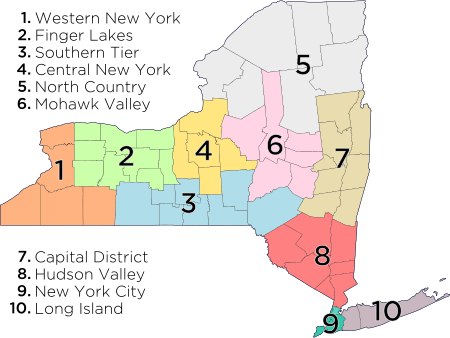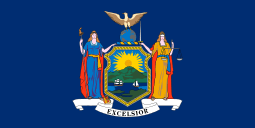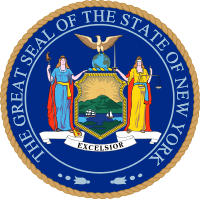Outline of New York
See also: Index of New York-related articles

The location of the State of New York in the United States of America
Main article: New York
The following outline is provided as an overview of and topical guide to the U.S. State of New York:
New York – U.S. state located on the Eastern seaboard and extending to the Great Lakes. Settled by the Dutch in the 17th century, New York was one of the original thirteen colonies. About one third of all the battles of the Revolutionary War took place in New York. New York enacted its constitution in 1777 and was the eleventh state to ratify the United States Constitution, on July 26, 1788. It is the fourth most populous state.
General reference

An enlargeable map of the State of New York
- Names
- Common name: New York
- Pronunciation:
 i/njuːˈjɔːrk/
i/njuːˈjɔːrk/
- Pronunciation:
- Official name: State of New York
- Abbreviations and name codes
- Postal symbol: NY
- ISO 3166-2 code: US-NY
- Internet second-level domain: .ny.us
- Nicknames
- The Empire State (currently used on license plates)
- Common name: New York
- Adjectival: New York
- Demonym: New Yorker
Geography of New York
- New York is: a U.S. state, a federal state of the United States of America
- Location
- Population of New York: 19,378,102 (2010 U.S. Census[1])
- Area of New York:
- Atlas of New York
- Places in New York
Environment of New York
Natural geographic features of New York
Regions of New York

Economic regions of New York
Administrative divisions of New York

An enlargeable map of the 62 counties of the State of New York
Demography of New York
Government and politics of New York
Main articles: Government of New York (state) and Politics of New York (state)
- Form of government: U.S. state government
- United States congressional delegations from New York
- New York State Capitol
- Elections in New York
- Political party strength in New York
Executive branch of the government of New York
- Governor of New York
- State departments
Legislative branch of the government of New York
- New York Legislature (bicameral)
- Upper house: New York State Senate
- Lower house: New York State Assembly
Judicial branch of the government of New York
Main article: Courts of New York
Law and order in New York
- Cannabis in New York
- Capital punishment in New York
- Constitution of New York
- Crime in New York
- Gun laws in New York
- Law enforcement in New York
- Same-sex marriage in New York
Military of New York
Local government in New York
History of New York
Main article: History of New York
History of New York by period
- French colony of Canada, 1534–(1609–1763)
- Dutch colony of Nieuw-Nederland, 1624–1652
- History of slavery in New York, 1626–1827
- Patroonship of Rensselaerswyck, 1630–1840s
- Dutch province of Nieuw-Nederland, 1652–1664
- English Province of New-York, 1664–1673
- Third Anglo-Dutch War, 1672–1674
- Netherlands military government of Nieuw-Nederland, 1673–1674
- Treaty of Westminster of 1674
- English Province of New-York, 1674–1688
- English Dominion of New-England in America, 1688–1689
- English Province of New-York, 1689–1707
- British Province of New-York, 1707–1776
- King George's War, 1740–1748
- French and Indian War, 1754–1763
- British Indian Reserve, 1763–1783
- American Revolutionary War, April 19, 1775 – September 3, 1783
- Capture of Fort Ticonderoga, May 10, 1775
- New York and New Jersey campaign, July 3, 1776 – July 26, 1777
- United States Declaration of Independence, July 4, 1776
- Saratoga campaign, June 14 – October 17, 1777
- Siege of Fort Ticonderoga, July 2–6, 1777
- Battles of Saratoga, September 19 – October 7, 1777
- Treaty of Paris, September 3, 1783
- State of New York since 1776
- Third state to ratify the Articles of Confederation and Perpetual Union, signed July 9, 1778
- Western territorial claims ceded 1782
- Eleventh State to ratify the Constitution of the United States of America on July 26, 1788
- War of 1812, June 18, 1812 – March 23, 1815
- Battle of Plattsburgh, 1814
- Treaty of Ghent, December 24, 1814
- Martin Van Buren becomes 8th President of the United States on March 4, 1837
- Mexican–American War, April 25, 1846 – February 2, 1848
- Millard Fillmore becomes 13th President of the United States on July 9, 1850
- American Civil War, April 12, 1861 – May 13, 1865
- New York in the American Civil War, 1861–1865
- Chester A. Arthur becomes 21st President of the United States on September 19, 1881
- Grover Cleveland becomes 22nd President of the United States on March 4, 1885
- Grover Cleveland also becomes 24th President of the United States on March 4, 1893
- Spanish–American War, April 25 – August 12, 1898
- Assassination of President William McKinley in Buffalo on September 6, 1901
- President McKinley dies in Buffalo on September 14, 1901
- Vice President (and former Governor) Theodore Roosevelt becomes 26th President of the United States on September 14, 1901
- Former Governor Franklin Delano Roosevelt becomes 32nd President of the United States on March 4, 1933
History of New York by region
History of New York by subject
Culture of New York
The Arts in New York
Sports in New York
Economy and infrastructure of New York
- Media:
- Hospitals in New York
- Transportation in New York
- Airports in New York
- Roads in New York
Education in New York
- Schools in New York
See also
- Bibliography of New York
- Topic overview:
- All pages beginning with "New York"
- All pages with titles containing New York
References
External links
This article is issued from Wikipedia - version of the 11/16/2016. The text is available under the Creative Commons Attribution/Share Alike but additional terms may apply for the media files.

